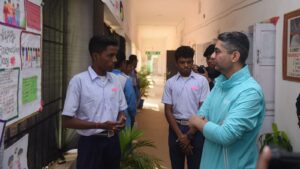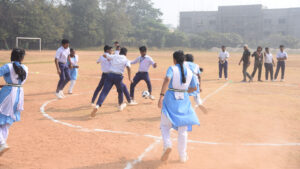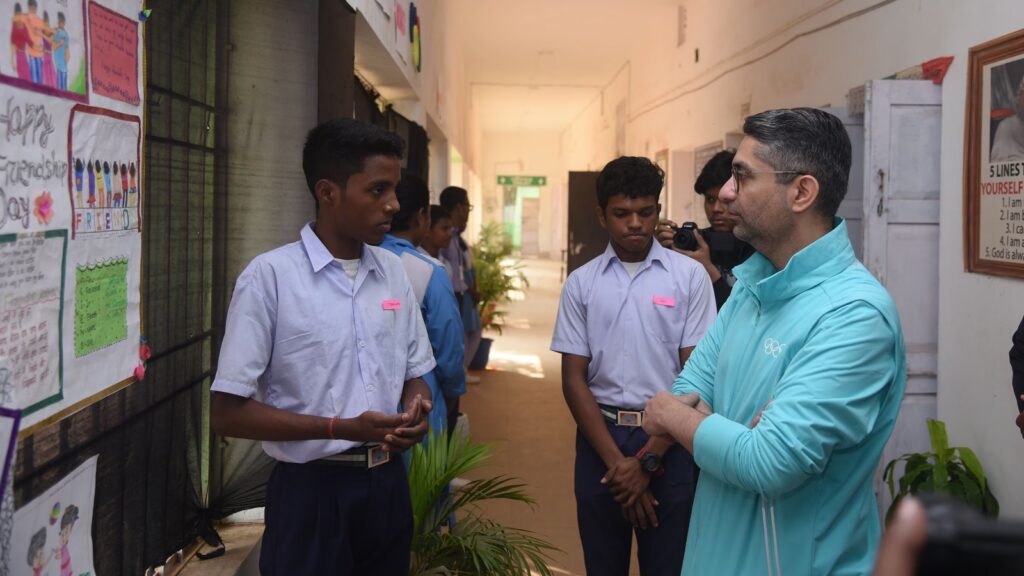
Boria Majumdar
“The football match will be in Capital High School Unit 3. You are welcome to attend,” said Karan Singh, project lead at the Abhinav Bindra Foundation. “Abhinav, Angelita, Frederique and Xenia from the IOC will also be there,” he added. For them, it was part of the scheduled visit. For me, it meant missing an IPL show and other important work. What’s there to go and see a match at a local football field? It can’t be anything that I haven’t seen before. More when it is being played in a school facility.
That’s when Abhinav stepped in and said: ‘Come, for you won’t regret it.’
He is someone I have the highest regard for, and hence I decided to give the IPL show a miss and accompany them to the football.
I am glad I did.
First, the facility was a real surprise. Located in a bylane of Bhubaneshwar, it is an international-standard facility. “Teams used it during the U-17 FIFA World Cup,” said one of the teachers. “Some ISL players also come and train here,” he went on to add.
A full-size football pitch with excellent changing rooms and also a residential hostel attached to it, the facility was the first eye-opener for the evening. And when the teams lined up, my interest peaked. They were both mixed-gender teams with half the side made up of girls. It was a first for me, and may I say, a very pleasant one.
As the match started, a couple of girls immediately made an impact. They were as good as the boys, and one could see the kind of talent that there is in India. “We now have 450 students staying in the hostel,” said the PE teacher. “And more and more girls are now taking to sport and wanting to be a part of the Olympic Values Education Programme,” he concluded.
OVEP has given these boys and girls a new lifeline. It is a way of thinking alien to many of us. It helps integrate sport in all that we do, and in doing so, builds character. Mixed-gender teams are a prime example. “What is fascinating is that in some of the teams, boys have nominated girls as leaders,” said Abhinav, his eyes lighting up as he speaks. “When I look back at my 22 years in sport, I don’t look back at the medals won. They don’t matter to you after a point. Rather, I look back at what sport has taught me. How sport has changed me as a person and how it has enabled me to make a difference.”

Angelita Teo, Director of the Olympic Foundation, Culture and Heritage, IOC and one whose support has been crucial for the project, seemed overwhelmed with what she was seeing. “I had heard a lot about the work being done,” she said. “But it is one thing to hear something, and then to come and see for yourself. What I have seen has exceeded my expectations. I will take it back to the IOC and we will back the project even bigger.”
And just as Angelita was about to tell me something more, she stopped and jumped up. The first goal had been scored, and the way it was celebrated by the boys and girls together was the success of the project being played out in front of our eyes.
Frederique Jamolli, Head International Cultural Affairs, IOC, who has been involved with the project since inception, helped put things in perspective. “See, the Olympics isn’t just a sports competition,” she said. “Yes, the games are hugely important but there is more to it than just the Games. That’s why it is a movement. And what you are seeing is evidence of that movement. Sport can change lives, and that’s what we are all here for.”
Xenia Kourgouzova, Senior Manager Education, IOC and one who has visited Odisha before, put it rather well. “I am pleased that teachers have included sport and integrated the values of OVEP into teaching other subjects,” she said. “We aren’t here to just promote sport. It is not about who wins or loses. It is about respect, friendship and excellence. And each is as important as the other. You can now see each of these values being integrated into programmes here giving us all a lot of satisfaction.”
By then, the match had ended. And true to the spirit of the project, it had ended in a 1-1 draw. As we were about to leave, two of the children walked up to Abhinav and Angelita and said in proper English, “We have watched you on TV. Now, we are seeing you in front of us. It is a dream fulfilled.” And Abhinav, overwhelmed, turned to us and said, “They are a dream I am living. My sporting legacy.”
For me, it was indeed an evening well spent.
Pleasure to see the OVEP work and impact on ground. Well done @Abhinav_Bindra Angelita Teo, Frederique Jamolli, Xenia and the entire IOC team. 150,000 students will now benefit from the effort. Changing lives. @iocmedia @sports_odisha @rvineel_krishna pic.twitter.com/7DFAm3fBAJ
— RevSportz (@RevSportz) April 5, 2023




